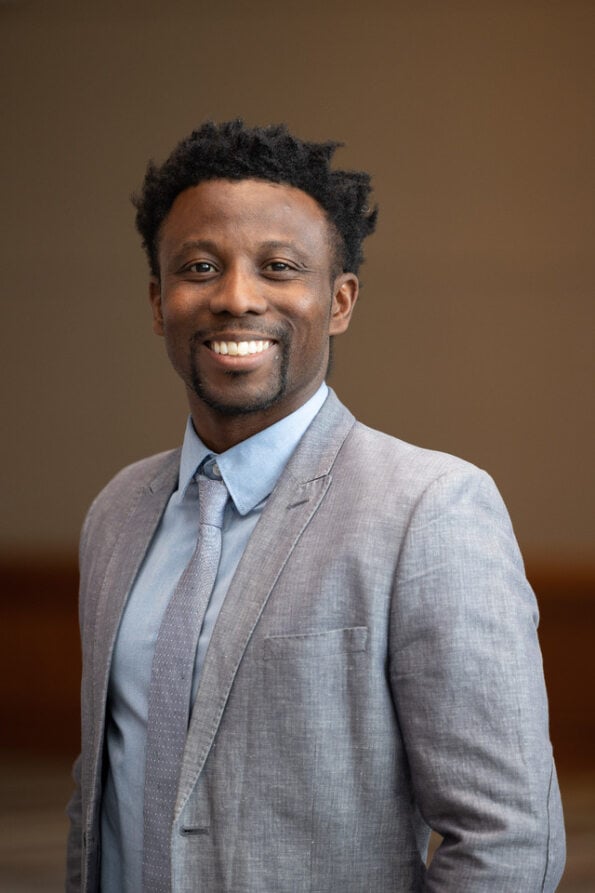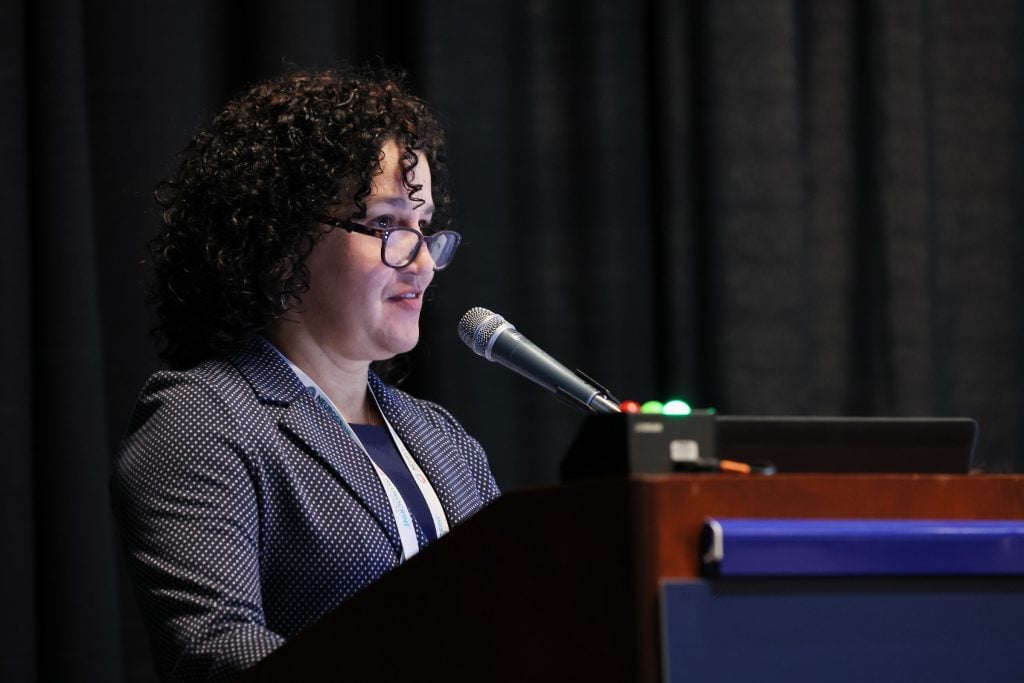A first-of-its-kind session at ENDO 2024 will discuss healthcare management for the most underserved of the underserved: the incarcerated. The session, “Endocrine Care for Incarcerated Individuals,” will offer a detailed look at not only what it’s like to be incarcerated, but also the challenges of delivering appropriate endocrine treatment to this often unfairly stigmatized population.
The United States incarcerates more people than any other country. According to Alicia Diaz-Thomas, MD, MPH, a pediatric endocrinologist and professor at the University of Tennessee Health Science Center in Memphis, the lifetime likelihood of being incarcerated is around one in 20 for all U.S. adults based on 2001 incarceration rates. This risk can vary by demographics, gender, and structural racism; non-Hispanic Black and Hispanic men are overrepresented, she says.
On Sunday, June 2, during ENDO 2024 in Boston, Diaz-Thomas and Stanley Andrisse, PhD, MBA, an endocrine scientist and assistant professor at the Howard University College of Medicine in Washington, D.C. will chair the session “Endocrine Care for Incarcerated Individuals.” The session will feature talks from four other presenters, many of whom are formerly incarcerated experts in the field.
Incarcerated individuals are often misunderstood, stigmatized, and even neglected when it comes to healthcare. A session like this has never been part of the ENDO program. “Endocrine care in prisons and jails is a topic that has not been discussed at the Endocrine Society meeting,” Andrisse says. “Incarcerated and formerly incarcerated people are the underserved of the underserved population. They regularly get left out of conversations. We hope to center the voices of incarcerated and formerly incarcerated people.”
Andrisse goes on to say that the objectives of this session are to briefly review the landscape of incarceration in the U.S. and its implications on health and healthcare; discuss prevalence, processes of care, clinical outcomes, and importance of post-prison public health linkages for incarcerated individuals with diabetes, hormone sensitive cancer, and those requiring transgender care; and provide information regarding health psychology practices that can assist with endocrine care of incarcerated persons.
“We hope to give an overall picture of the challenges that mass incarceration presents to our healthcare system and overall community wellbeing,” Andrisse says. “Then we hope to provide specific insights to the challenges and lack of endocrine care inside prisons and jails.”
“By the numbers, it is likely that you, your friend, neighbor, partner, or family member may have been or is connected to someone who is currently or formerly incarcerated,” Diaz-Thomas says. “We also have formerly incarcerated persons that are brilliant endocrine scientists and physicians!”
A Voice for the Voiceless
Andrisse himself is a formerly incarcerated person, with three felony convictions, who was sentenced to 10 years in prison (as detailed in the September 2021 cover story of Endocrine News, as well as Andrisse’s own memoir From Prison Cells to PhD: It’s Never Too Late to Do Good). He now serves as an Endocrine Society Board member, where he liaises between the Board and one of two committees: the Advocacy and Public Outreach Core Committee (APOCC) and the Committee on Diversity and Inclusion (CoDI). “In these two committees, I brought up the issue of endocrine care in prisons and jails and that sparked multiple conversations,” Andrisse says. “The chair of the Diversity committee, Alicia Diaz Thomas, and I then submitted a session proposal that was accepted by the planning committee.”

“The Endocrine Society has a powerful voice in terms of healthcare and specifically endocrine care priorities. I hope to bring voice to the voiceless. I hope to bring awareness of the disparities faced by incarcerated populations.” — Stanley Andrisse, PhD, MBA, assistant professor of medicine, Howard University College of Medicine, Washington, D.C.
And while this topic is novel for an ENDO session, Andrisse feels like this is a perfect venue to share stories of those who might not be able to tell them otherwise. “The Endocrine Society has a powerful voice in terms of healthcare and specifically endocrine care priorities,” he says. “I hope to bring voice to the voiceless. I hope to bring awareness of the disparities faced by incarcerated populations.”
One example of those disparities is, again, the overrepresentation of non-Hispanic Black and Hispanic men in correctional facilities, Diaz-Thomas says. “The disproportionate representation of non-Hispanic Black and Hispanic men in prisons and jails, persons who already tend to have disproportionately worse outcomes in relation to endocrine care due to systemic racism, only further compounds this problem,” she says.
Another example: In April 2023, The Appeal ran a story about transgender women reporting self-harm at a men’s prison in New Jersey when they were refused transfer to a women’s facility. “Incarcerated people have been reported to perform ‘self-surgeries’ or self-mutilations after being denied transgender care,” Andrisse says. “These types of stories need to be brought to the attention of endocrine specialists.”
Limited Resources
Such stories also speak to the myriad challenges incarcerated people face when trying to access healthcare. Andrisse says that the overarching problem is the stigma and negative narrative associated with incarcerated people and how that stigma leads to either not caring about or not even caring to know about the dismal care these individuals are receiving. But the list of challenges goes beyond that.
For one, there are limited resources. Andrisse tells Endocrine News that correctional facilities often operate with limited budgets and resources, which can affect the availability of specialized medical equipment, medications, and qualified healthcare professionals.
Overcrowded prisons can make it difficult for healthcare providers to adequately assess and address the healthcare needs of each incarcerated individual, including those with endocrine conditions. And in some cases, according to Andrisse, prisons and jails can limit access to specialists, putting up a barrier to care for complex endocrine conditions.
These limited resources and limited access to specialists can often lead to a limited understanding of endocrine conditions, even one as widespread and well-known as diabetes. “Care of endocrine conditions such as diabetes in prisons and jails can be improved, from screening to prevention to treatment to outcomes,” Diaz-Thomas says. “Persons entering a prison or jail may be screened for such things as HIV or hepatitis B but not diabetes.”
Incarcerated individuals also face inadequate mental health support. “Endocrine health can be closely linked to mental well-being,” Andrisse says. “Inadequate mental health support within correctional facilities may negatively impact the management of endocrine conditions.”

“Care of endocrine conditions such as diabetes in prisons and jails can be improved, from screening to prevention to treatment to outcomes. Persons entering a prison or jail may be screened for such things as HIV or hepatitis B but not diabetes.” — Alicia Diaz-Thomas, MD, MPH, professor, University of Tennessee Health Science Center, Memphis, Tennessee
Diaz-Thomas also points to the fact that the incarcerated population is aging, thus increasing the burden of conditions that manifest later in life, many of which include endocrine conditions.
Then there are legal and policy issues. The Appeal report about the transgender women in New Jersey pointed out that the state has granted prison officials more power to deny transgender people’s request to be incarcerated in facilities that align with their gender identity. “In October, New Jersey amended DOC policy to expand prison officials’ authority to override the housing preferences of trans, nonbinary, or intersex prisoners,” the report reads.
“Legal and policy issues, such as restrictions on certain medications or treatments, may limit the options available for managing endocrine disorders within the correctional system,” Andrisse says.
Love and Facts
Policies like this grow out of the stigma these individuals face, even after they’ve been released. For Diaz-Thomas, the first step to facing down this stigma is to address the stereotypes that we have been presented with and have internalized about incarcerated persons. “Secondly, our job as physicians, or other healthcare providers is not to judge but to provide care and ease suffering where we can,” she says. “Acknowledging our own bias and taking steps to mitigate bias can help us focus on our role in caring for people. Finally, from a public health and systems perspective, we cannot ignore the current gaps in healthcare for incarcerated or formerly incarcerated persons that lead to otherwise preventable poor health outcomes and high need for ever more complex medical care.”
Andrisse says he’s focusing his talk on love and facts. “I try to center my life around love and facts,” he says. “My research is based on a love and passion for what I do. A love for the people I seek to help. And presenting facts and data.”
And when asked about what he would say to healthcare providers who may harbor some stigma or hesitation that bars them from optimally caring for incarcerated and formerly incarcerated individuals, Andrisse speaks love and facts: “We are all humans.”
“This is an important topic that we have not discussed before,” Diaz-Thomas says. “There is great potential here for endocrine physicians, health systems scientists, clinical researchers, and advocates to make a difference in this often neglected but large and growing population.”
Bagley is the senior editor of Endocrine News. In the March issue, he wrote about the confounding enigma behind monogenic obesity in pediatric patients.

